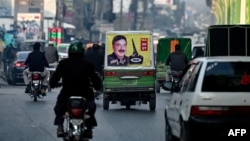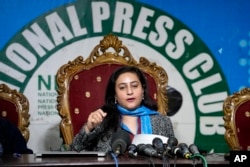Members of Pakistan’s senate passed a controversial resolution Friday calling for a delay in general elections just weeks before voters head to the polls.
The non-binding resolution that quickly drew condemnation cited bad weather, a poor security situation and a rise in COVID-19 cases as reasons to postpone the February 8 vote by a few months.
“The voter turnout in colder areas remains notably high during the moderate weather condition[s]. January and February are recognized as the coldest months in a majority of the areas [of] Baluchistan and Khyber Pakhtunkhwa,” said Dilawar Khan, an independent senator from Pakistan’s northwestern Khyber Pakhtunkhwa province, as he introduced the resolution.
Khan also cited recent attacks on high-profile politicians in Khyber Pakhtunkhwa, and threat alerts issued by authorities asking politicians in the province to take precautions, as evidence that the environment was not conducive to holding general elections.
Just 14 senators out of 100 members were present. Senate rules require one-fourth of the total Senate membership to be present for a quorum.
While the majority of those present supported the resolution, major political parties as well as civil society advocates quickly rejected it.
Calling it a “conspiracy,” Ahmed Bilal Mehboob, president of Lahore-based think tank Pakistan Institute of Legislative Development and Transparency, or PILDAT, said the unexpected action taken by a few senators was an insult to the dignity of the parliament.
“This is [an attempt] by a few people who deeply wish that Pakistan should not hold elections, the democratic process should not move ahead and Pakistan should stay stuck in this [uncertainty] and caretaker governments’ term be extended,” Mehboob said.
Afnanullah Khan, a senator from former prime minister Nawaz Sharif's party, which won the violence-riddled 2013 election, told VOA there was no reason to delay elections.
"We held elections when the situation in our country was much worse ... why can't we do so now?" Khan asked.
Rumors of election delays have been swirling for months in Pakistan. Mehboob said the non-binding resolution, if considered for implementation, will have to be looked at in light of the country's laws and the constitution.
The February vote is already coming after months of delay. The election should have been held by mid-November last year after the parliament elected in 2018 finished its term last August. Pakistan's constitution requires elections within 90 days of the parliament completing its five-year term.
The February 8 date came only after the Supreme Court of Pakistan intervened to end a deadlock between the country’s independent election commission and the president’s office over who had the authority to call elections, and when to hold them.
The South Asian nation of more than 240 million people has been run by a caretaker administration since August. The setup is meant to ensure free and fair elections but has been frequently accused of working in favor of pro-military political parties.
The accusations stem from a military-backed crackdown on former Prime Minister Imran Khan's party. The incarcerated politician’s Pakistan Tehreek-e-Insaaf party, or PTI, was deprived this week of its iconic election symbol, a cricket bat, while top leaders as well as hundreds of others saw their nomination forms rejected.
While many of the rejections are being reversed by election tribunals, the PTI party has faced a severe crackdown since May last year when Khan’s supporters stormed military installations and properties to protest his arrest.
Citing efforts to muzzle PTI, the independent Human Rights Commission of Pakistan this week said that there was little evidence to show the upcoming elections will be free, fair or credible.
Murtaza Solangi, the caretaker information minister, has repeatedly rejected the charge that the administration is skewing the electoral landscape against PTI.
Solangi, who also serves as the minister for parliamentary affairs, opposed Friday’s resolution in the senate.
PTI called on the country's top court to take action against any efforts to delay the elections.
Hours after the controversial resolution was passed, Senator Mushtaq Ahmed Khan of the religious political party Jamat-e-Islami introduced a counter-resolution calling for timely elections. He declared the demand to delay elections “unconstitutional and undemocratic.”
In a hastily called press conference, Senator Sherry Rehman, representing Pakistan People’s Party, one of the major political parties, also rejected the call for delaying elections, saying “we should move on.”
The security situation in Pakistan has deteriorated over the last year. Militant attacks across Pakistan killed about 500 civilians and more than 500 police and military personnel in 2023, according to a report by the Islamabad-based independent Center for Research and Security Studies.






